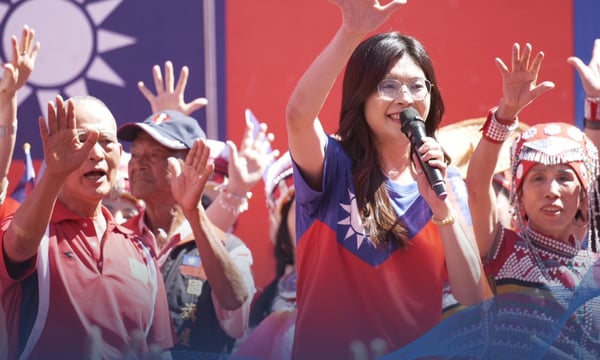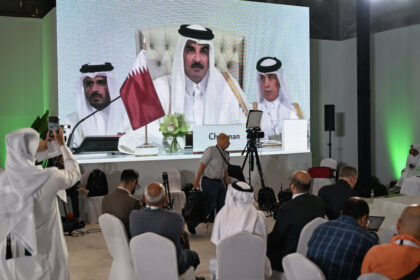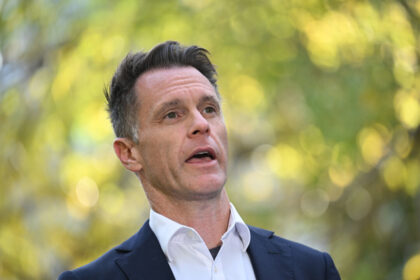On October 18, members of the Kuomintang (KMT), Taiwan’s main opposition party, elected Cheng Li-wun, a relative outsider to the party elite who campaigned on a platform of reform, as their party chair. Although turnout was relatively low, the results were not close – Cheng secured a decisive victory in the six-way race, claiming a more than 10 point margin over her closest competitor, former Taipei City mayor Hau Lung-bin, who had been widely backed by the KMT establishment.
Cheng’s rapid ascent in the KMT is notable for several reasons. First, she was formerly an active member of the KMT’s main political rival, the Democratic Progressive Party (DPP), which has won the last three presidential elections.
As a university student, Cheng participated in the 1990 Wild Lily Movement – student-led protests that opposed the KMT’s 40-plus year run of authoritarian rule and demanded direct presidential elections, among other goals. Far from a moderate inclined toward cross-party collaboration, Cheng was on the assertive end of the DPP political spectrum on issues such as Taiwanese independence and opposition to the KMT. Cheng herself has stated that she was a “Taiwanese independence fundamentalist” early in her career, and images from student protests show her referring to the KMT as a “consciousless and brutal regime.”
Cheng worked in DPP politics for several years, holding positions in both the National Assembly – the precursor to Taiwan’s current legislature – and the DPP’s Youth Department. Her relationship with the DPP appears to have soured after the party’s first presidential victory. In 2002, the DPP suspended her after she publicly supported later debunked sexual misconduct allegations against a DPP official. Within a few years, she reemerged as a member of the KMT, serving as a legislator and later as spokesperson for the Executive Yuan under then-President Ma Ying-jeou.
Despite holding high-profile roles, Cheng has limited experience winning campaigns. She held seats in Taiwan’s Legislative Yuan from 2008–2012 and 2020–2024, but both times was elected via party list appointment rather than popular vote.
Cheng’s KMT chair victory is also notable because her campaign promised reform, positioning her in contrast to the KMT establishment, which was thought to be resurgent after the unanimous failure of recall votes targeting 31 KMT legislators this summer. In campaign trail interviews, Cheng emphasized her desire for a “reborn KMT” that reengages young people. She also called for an end to “backroom deals” and “private anointing” of candidates – all pointed digs at the party establishment, which has failed to win Taiwan’s presidency in three consecutive elections.
Cheng paired her reformist rhetoric with an embrace of ideas that many in the KMT have grown wary, like the 1992 Consensus, an agreement between the KMT and the Chinese Communist Party (CCP) that provided a framework for cross-strait ties. In the KMT’s bruising loss in the 2020 presidential election, voters expressed skepticism toward the party’s more conciliatory approach to China. Since then, the KMT’s old guard has spent much of its time preoccupied with reinventing itself for a Taiwanese public that increasingly rejects unification and favors maintaining the status quo. As a result, Hou Yu-ih, the KMT’s 2024 presidential candidate, was initially hesitant to endorse the 1992 Consensus, which was once the foundation of the KMT’s cross-strait policy.
Cheng, in contrast, lent unreserved support to the 1992 Consensus during the race for party chair, referring to it as the “foundation of mutual trust” between Taiwan and China. While Cheng has been careful in her use of precise political language regarding unification with China, some of her statements – including that she hopes all Taiwanese “will proudly and confidently say ‘I am Chinese’” and that both sides of the Taiwan Strait should “join forces to reach new heights” – come notably close.
Comments like these, along with AI-generated disinformation campaigns targeting Cheng’s main rival Hau, have fueled speculation in Taiwanese media that the CCP may have been supporting Cheng’s bid for the KMT chair. Allegations of Chinese interference in Taiwanese elections are hardly new, but they are most often levied by the DPP against the KMT, with the latter typically swift to dismiss these claims outright. In the final week of the KMT party chair race, however, Jaw Shaw-kong, who was the party’s 2024 vice presidential candidate and had publicly endorsed Hau, openly accused Beijing of intervening in the race to support Cheng.
Such exchanges mark a break within the KMT’s ranks over its prior strategy of largely dismissing claims of Chinese interference in Taiwan’s elections. Some in the party establishment – long accustomed to assuming they enjoy Beijing’s favor – appear unsettled by reports that social media disinformation activities based outside Taiwan may have supported an outsider like Cheng. Such revelations likely compound concerns within the party over speculation that Beijing favored Ko Wen-je, the candidate for the upstart Taiwan People’s Party (TPP), over Hou Yu-ih in the 2024 presidential election due to the former’s clearer positioning on cross-strait politics.
Even as the KMT has struggled with its post-2020 messaging, however, it takes pride in its ability to engage in official dialogue with China. That has been an important talking point in the party’s efforts to convince Taiwanese voters that the KMT is best positioned to provide peace. In contrast, Beijing has been unwilling to engage directly with the DPP due to the party’s perceived pro-independence stance.
Despite Jaw’s accusations, KMT leadership has expressed a desire for unity in the days since Cheng’s victory. As Cheng approaches her November 1 start date as KMT chair, the question becomes how her reformist ambitions will fare as she contends with more traditional members of her party.
Although her most important tasks will include overseeing the selection of candidates for Taiwan’s 2026 local elections and 2028 presidential election, an early signpost for her tenure is likely to be whether she delivers on outgoing chair Eric Chu’s pledge to increase Taiwan’s defense budget to as much as 3.5 percent GDP. Chu made this concession in June 2025, after members of the U.S. Congress criticized the KMT’s efforts to block funding for Taiwan’s defense budget amid increasing threats from China. On the campaign trail, however, Cheng criticized demands that Taiwan spend more on defense, noting that countries such as Japan and South Korea pay far less for defense than President Lai Ching-te’s vision of 5 percent GDP defense spending by 2030.
Defense spending aside, Cheng faces more pressing questions over how she will position the KMT in Taiwan’s ongoing political and institutional crises. Taiwan is approaching another contentious budgetary season, in which the DPP administration will propose a budget that must win approval from the Legislative Yuan, where the KMT and TPP collectively hold the majority – a feat that proved difficult in 2025. Moreover, Taiwan’s Constitutional Court has been unable to issue decisions for nearly a year due to recent KMT-led legislative changes. This legislative and legal paralysis not only undermines the functioning of Taiwan’s hard-won democratic institutions but also weakens their ability to deliver for all Taiwanese.






